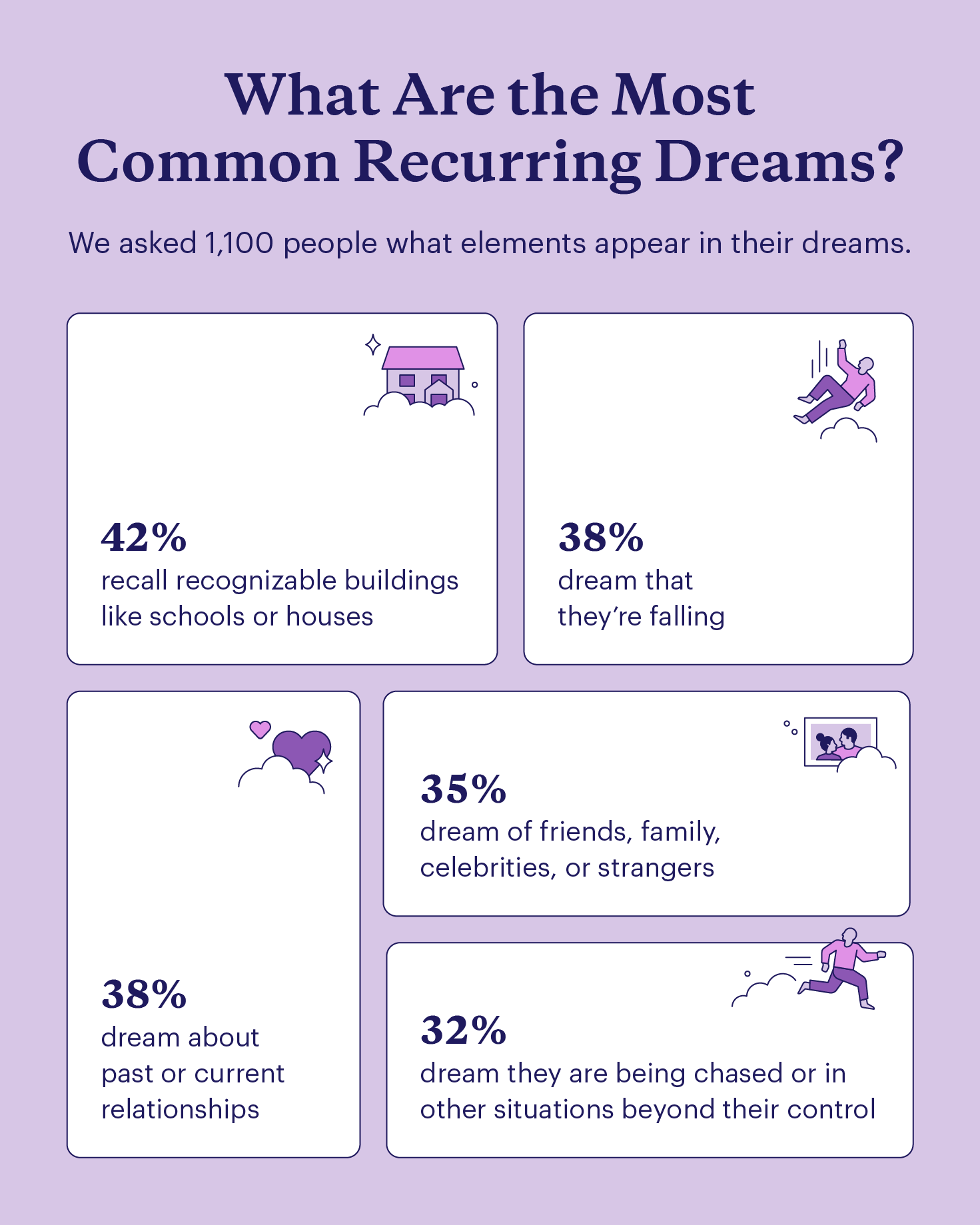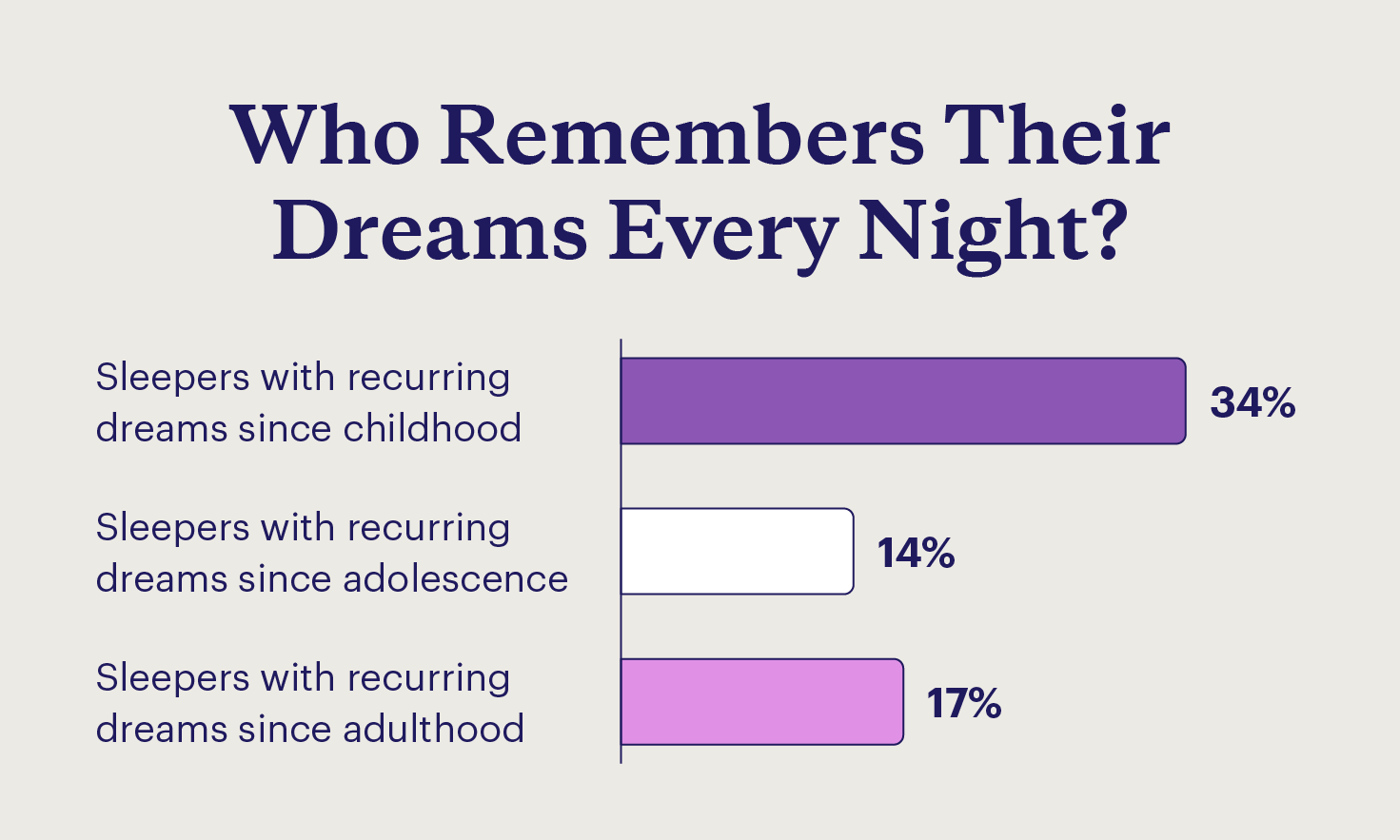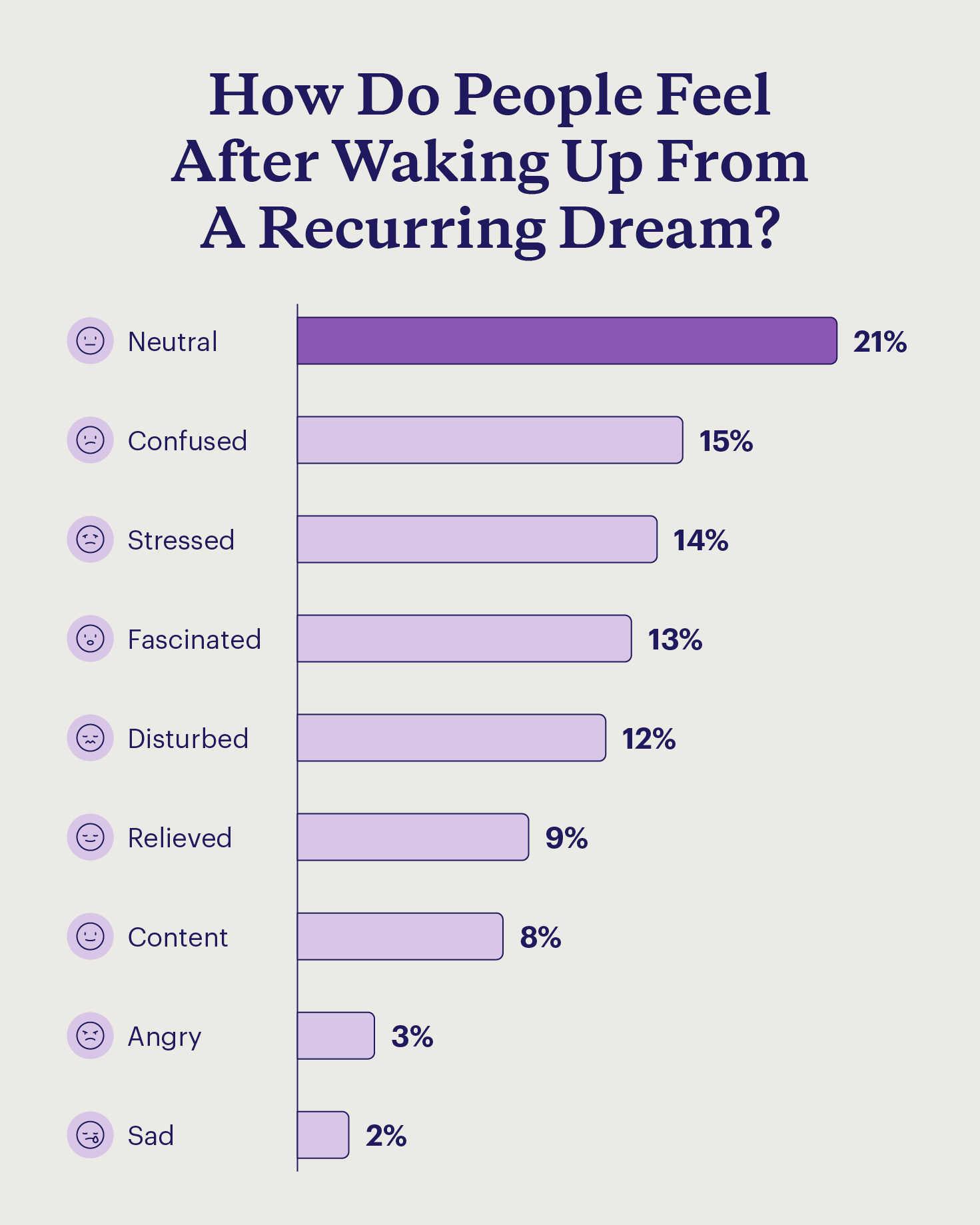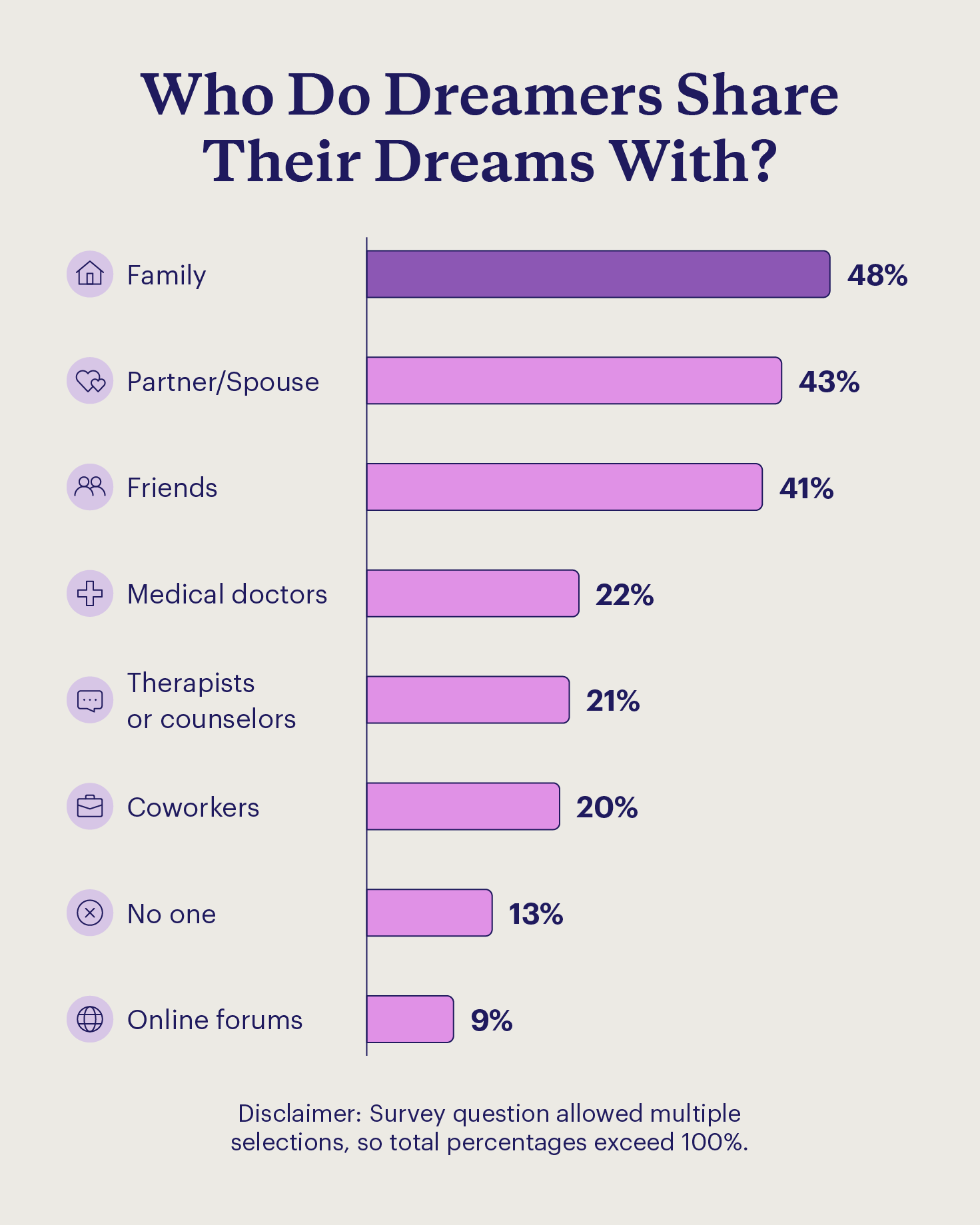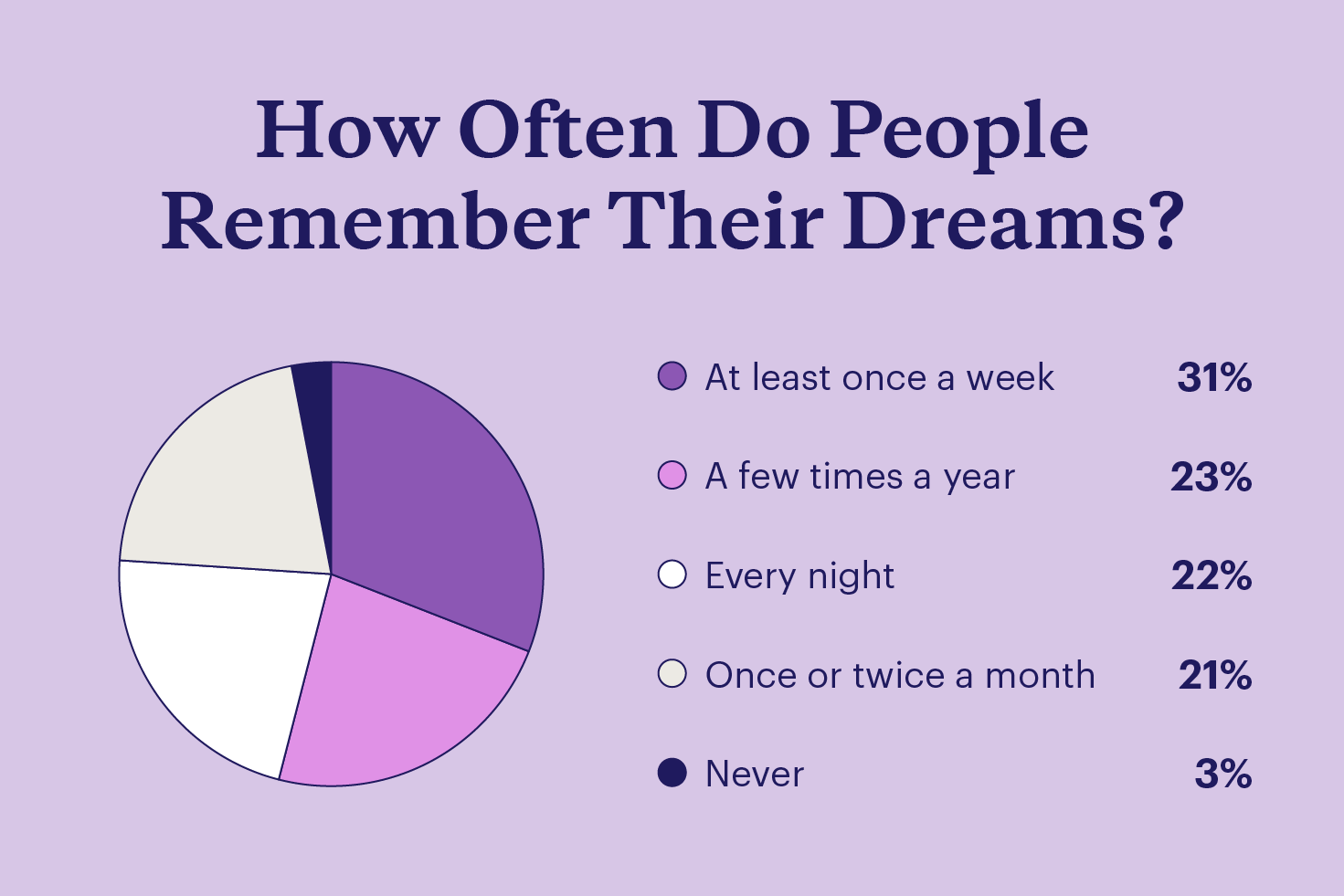Survey: 42% of Americans Have This Common Recurring Dream [+ Dream Meanings]
How common are recurring dreams, and what do dreams mean?
- Over 91% of American adults have had recurring dreams.
- Dreams have meaning for 3 out of 4 Americans.
- The most common theme is buildings, with more than 42% recalling distinct buildings in their dreams.
Dreams have fascinated people for centuries for good reason. We know why we sleep but not exactly why we dream, though there have been many scientific studies on the subject.
We surveyed over 1,100 U.S. adults to learn more about the most common recurring dreams. We found that 3 in 4 adults believe dreams have deeper meaning and can provide insight into our psyche, but whether that is objectively true or not remains unclear.
Keep reading to learn more about the most common recurring dreams, what they may mean, and what dreamers believe their dreams are telling them.
Key Takeaways
Whether you remember them or not, an undeniable fact about sleep is that everyone dreams. To find the most common dreams people have, we asked U.S. adults about their recurring dream experiences and learned:
- Only 8% of adults have never had a recurring dream.
- Less than 3% never remember their dreams.
- Recognizable buildings appear in recurring dreams for 42% of adults.
- Just over 13% keep their dreams to themselves.
Considering that more than 4 out of 5 Americans remember that they dreamt most nights, exploring the most common recurring themes may provide insight into what topics, fears, and daily features are most prominent for sleepers.
40% Had Their First Recurring Dream in Childhood
Recurring dreams seem to start young, with nearly 60% reporting recurring dreams, motifs, or themes in their dreams since childhood or adolescence — most of whom first experienced these dreams as a child.
Adults who’ve had recurring dreams since childhood report feeling neutral (19%) or fascinated (17%) by these dreams.
Comparatively, those who started having recurring dreams as teenagers were more likely to report feeling confused (21%), and for those who only started having these dreams as adults, most reported feeling neutral (22%) or stressed (18%).
76% Believe Their Dreams Are Telling Them Something
Whether for practical, spiritual, or entertainment reasons, a majority of dreamers seem to believe that their dreams have some sort of meaning, and over 63% try to interpret their dreams at least some of the time. We also found that:
- Thirty-four percent believe they are a reflection of their daily lives.
- Fifteen percent believe they have a religious or spiritual meaning.
- Thirteen percent believe they help organize their thoughts or solve problems.
- Thirteen percent believe their meanings are purely for entertainment.
Of the remaining dreamers, 19% indicated that they weren’t sure, and only 4% were convinced that their dreams have no meaning at all.
63% of Dreams Are Rooted in Reality
Nearly one-third of adults describe their dreams as “very realistic,” with another 30% describing them as “somewhat realistic.” Dreams often draw from waking thoughts and memories, so it stands to reason that a majority of dreams feel more realistic than strange. 1
There seems to be little difference between what occurs in realistic or strange dreams. Around one-third of both groups report remembering their dreams every night. Similarly, 39% of those with very realistic dreams and 35% of those with very strange dreams try to interpret their dreams more often than not.
15 Most Common Dreams and Their Meanings
Dreams are notoriously difficult to study, as researchers can’t directly observe or interact with the dreams themselves and instead rely on subjective individual reports.2
Though research is limited, some studies suggest that recurring dreams may result from unmet psychological needs, such as forming connections, feeling competent, and having autonomy.3
While plenty of resources are available to help you interpret everything from realistic stress dreams to bizarre and comical dreams, the potential meanings of different dream symbols are highly subjective and up to interpretation.
Many recurring dreams have unsettling, uncomfortable, or confusing themes, but uncovering what these dreams may mean requires research and introspection. Based on our survey findings, some of the most common dreams include the following elements:
1. Buildings
The most common element in recurring dreams was recognizable buildings, such as public places or a childhood home, according to 42% of our survey respondents.
We spend most of our lives in or around different buildings, so it stands to reason that these structures would appear in dreams. Buildings can represent several things, depending on what they look like and how familiar they are. The exact meaning, if any, may vary depending on the context of your dream, but buildings may symbolize:
- Safety and security: Dreaming of a childhood home, a favorite local spot, or a place that feels comfortable could indicate a desire for peace and stability.
- Change and growth: A dream of a building being constructed could represent your own development or a change of perspective.
- Repression or rebirth: Similarly, a collapsing building could suggest a significant shift in your life, from dealing with repressed emotions to beginning something new.
- Uncertainty or opportunity: An unfamiliar place or a building with many rooms could represent your unease or potential, depending on how you feel about it.
2. Falling
If you’ve ever jolted awake while dozing off with a startling leg kick, you may have been dreaming that you were falling. Often considered one of the most common dreams, falling tied for second place in our survey, with nearly 38% of respondents indicating their recurring dreams entail a fall.
Dreams of falling tend to stir anxiety, and they may represent feelings like:
- Insecurity or inadequacy: Falling in your dreams can represent a concern that you fall short of your own or others’ expectations.
- Losing control: A dream that you’re falling from a great height could suggest you feel like you don’t have control over parts of your life.
- Letting go: Recurring dreams about falling could be a sign to let go of something weighing you down or an indicator that you’ve abandoned something you shouldn’t have, depending on how the dream makes you feel.
If you keep waking up from dreams about falling, learning tips for how to sleep better may help you fall and stay asleep more easily.
3. Relationships
For social creatures, dreams about romantic relationships are naturally quite common. For nearly 38% of adults, recurring dreams may feature:
- Past partners
- Current relationships
- Prospective or fantasized relationships
Generally, relationship dreams may symbolize a desire for connection and companionship or fears surrounding a current relationship.
4. Other People
Dreaming about people beyond romantic partners is also fairly common. More than 1 in 3 adults report recurring dreams featuring other people, which may include:
- Family members
- Friends
- Coworkers
- Neighbors
- Celebrities
- Fictional characters
- Strangers
Dreaming about celebrities may indicate that you might relate to them or idolize some part of them, but they may also appear in your dreams simply because you encountered their name or picture while awake.
The same goes for family, friends, and other people you know in your waking life; interactions, unresolved conflicts, or subconscious thoughts involving these individuals can result in them appearing in your dreams.
5. Lack of Control
Around 3 in 10 adults dream of situations beyond their control. Being chased or feeling lost are two common examples of this kind of dream. Dreaming about these situations can be stressful for the dreamer, and these dreams can represent:
- Uncertainty or insecurity: Dreaming that you’re lost or otherwise have no control over a situation may reflect that you feel unsure about what to do or doubt your ability to handle something in real life.
- Avoidance of danger: Being chased by someone or something in a dream may remind you of burdens you may be avoiding or ignoring.
Feel like your dreams and sleep schedule are out of control? Use our sleep calculator to get recommendations for when to sleep and wake up so you can sleep better night after night.
6. Immobility
For nearly 1 in 3 people, their dreams contain distressing themes like immobility. Feeling trapped, retrained, or otherwise unable to move are common examples. Some dreamers find they can’t speak in their dreams, or they’re stuck hiding from something or someone.
Immobility dreams may represent:
- Feeling trapped: Being unable to move might mean you feel trapped or unable to move on from a significant life experience.
- Feeling judged: A trapped dream may symbolize how you feel boxed in by your career, an unhappy relationship, or others’ expectations.
- Insecurity or miscommunication: Being unable to speak may suggest a lack of assertiveness and confidence, or you may feel unheard or misunderstood.
7. Disasters
Dreaming of natural disasters, traumatic incidents, or catastrophic events is common for more than 30% of adults, featuring themes like tornadoes, fire, flooding, and car accidents.
Disasters in dreams may simply represent your waking concerns, so it can be beneficial to reflect on current events or other media you’ve recently seen. But if this isn’t the case, your disaster dreams could indicate:
- Instability or anxiety: Experiencing a disaster in a dream may suggest you feel like situations in your personal life are beyond your control.
- Overwhelming emotions: Dreaming of raging fires or rising flood waters could symbolize strong emotions like sorrow or anger building up.
Intense dreams can be troubling to experience. If your dreams are keeping you from staying asleep or causing you distress, you should consult a doctor or mental health professional for a treatment plan.
8. Teeth Falling Out
For the 29% of people who have dreamt that their teeth are falling out, the idea that these dreams are a bad omen can cause some anxiety.
Dreams about teeth falling out may indicate insecurities about appearance or a loss of power, self-assertiveness, or another part of yourself. Losing your teeth in a dream may also represent feelings about getting older, and in some cases, dreams about your teeth falling out could be tied to teeth grinding in your sleep.
9. Supernatural Elements
In your dreams, almost anything is possible. Supernatural powers, broken laws of physics, and other impossibilities occur in around 27% of peoples’ dreams. These dreams can be empowering and wondrous and may represent your desire to have more influence over your life.
Dreaming about flying, for example, may be an expression of the desire for freedom or power or a sign to take a new approach to an old problem.
10. Embarrassment
Better in dreams than in real life, humiliation is a common theme for 25% of adults. Dreamers may experience several embarrassing situations, such as:
- Being back in school
- Failing a test
- Being unprepared for work
- Running late
- Public nudity
Dreaming of something that makes you feel embarrassed, exposed, or vulnerable may directly reflect your feelings in waking life. But they may also represent anxiety about failing, being perceived in a negative light, or a lack of self-confidence.
11. Bodily Harm
Dreams about pain or harm are not uncommon, with more than 1 in 5 people reporting dreams of this nature. Dreaming that someone or something is hurting you may suggest you are worried about emotional, financial, or physical harm in real life.
If you dream that you are acting aggressively, you may realize anger or frustration has been building up with that person, or you may feel like a confrontation is necessary.
12. Death or Dying
More than 20% of people report recurring dreams that involve death or dying, and while they can be disturbing, dreams involving death don’t mean you’re knocking at death’s door.
In fact, most interpretations of death dreams suggest that they represent a change or transformation, often for the better. Death can symbolize endings and new beginnings, though any meaning will highly depend on the context within the dream, your feelings toward this symbol in the dream, and your current circumstances.
13. Health Conditions
Health conditions like illnesses, diseases, or pregnancy occur in over 20% of recurring dreams. Pregnancy dreams may be more common for anyone in a new relationship or those who are applying for a new job, but anyone can have them.
Since pregnancy is a widespread condition, it can appear in dreams if you are thinking about having children or if you encounter a pregnant individual during the day. Dreams about pregnancy may symbolize something in your life that is developing, such as a creative project or the self-discovery process.
14. Unknown Rooms In Their Houses
Finding strange or unfamiliar rooms in your home is an unusual but not uncommon dream, appearing in just over 20% of recurring dreams. While it might be alarming to discover your house has a room you’ve never noticed before, dreaming about this situation can be a positive symbol.
In some dream interpretations, houses may represent your sense of self. Finding new rooms can indicate discovering something new about yourself or finding new opportunities to learn and grow.
15. Animals
Animals were the least common dream feature according to our survey, with just 16% recalling animals in their dreams. Some of the most common animals to see in dreams include:
- Snakes
- Spiders
- Birds
- Pets
The meaning behind an animal-centric dream ultimately depends on the type of animal, its behavior, and your interaction with it. For example, domesticated animals may symbolize loyalty, security, and harmony if you have a positive experience with the creature in your dream.
A dream about caging an animal might be an expression of your desire to control a part of your life that may seem unmanageable, while fighting an animal may represent an urge to suppress a part of yourself.
Our methodology: We surveyed 1,107 U.S. adults 18+ via SurveyMonkey on October 8, 2024. Data is unweighted and the margin of error is approximately +/-3% for the overall sample with a 95% confidence level.
What Are Dreams?
Dreams are natural, universal phenomena that occur during the rapid eye movement (REM) stage of sleep.4 During this stage, the brain becomes highly active and experiences images, emotions, and sensations across a single scene or a series of events that may or may not seem related.
Everyone dreams during REM sleep, but not all sleepers can remember their dreams. In one study, researchers observed brain waves during sleep, concluding that higher amounts of theta wave activity after waking from REM sleep were connected to better dream recall.5
Theta waves typically correlate with memory, suggesting that the brain uses the same process to remember dreams as it does to create and reference waking memories.6
Another study found that the amygdala and hippocampus (parts of the brain connected to processing emotion and memory, respectively) were tied to some of the most memorable dreams — those that are especially intense, vivid, or strange.7
Why Do We Dream?
There are a few theories surrounding why we dream. Some of the most popular include:
- Consolidating memories: Researchers believe that dreams help us process and consolidate memories from the day.8
- Confronting unresolved issues: One theory suggests that dreams allow you to confront emotions or conflicts you couldn’t address while awake.9
- Exploring repressed feelings: Psychologists like Sigmund Freud and Carl Jung suggested that unconscious feelings manifest in dreams.10
- Reflection of current mental state: Someone experiencing anxiety or high levels of stress may have stressful dreams as a result.
- Threat simulation: Some scientists believe that dreams may act as a defense mechanism to practice and prepare for harmful situations or experiences.
- Wish fulfillment: Dreams may be connections between real-life experiences, wishes, and desires, according to Freudian psychology.
- Threat simulation theory: This hypothesis suggests that dreams sometimes act as a defense mechanism for preparing against potentially threatening events.11
- Activation-synthesis hypothesis: Some researchers believe dreams are simply a byproduct of synthesizing brain activity during sleep and have no specific purpose.12
So, Do Dreams Actually Mean Anything?
The meaning of the most common recurring dreams depends on the dreamer and how they interpret them. While researchers, therapists, and other dream experts may provide insight, the meaning a person finds in their own dreams will be the most significant.
Upgrading your bedroom won’t necessarily make your dreams more pleasant, but you can get deeper sleep that feels more restorative and restful when you sleep on a Purple mattress.
Whether you’re a dedicated dream journalist or you’ve had one memorable dream you want to explore, make sure you have a comfortable sleep environment to lay your head down to dream again.
FAQ
In our survey of over 1,100 U.S. adults, we found that the 10 most common recurring dreams featured:
- Recognizable buildings
- Falling
- Relationships
- Other people
- Lack of control
- Immobility
- Disasters
- Teeth falling out
- Supernatural or magical elements
- Embarrassing scenarios
Lucid dreaming is considered the rarest type of dream, in which sleepers are aware that they are dreaming and may influence and change elements of the dream as it happens.
The color purple can represent luxury, royalty, creativity, and ambition in dreams and other applications. If you dream of the color purple and feel it’s significant, you should consider any personal connections you have to the color first.
No, dreams cannot explicitly predict your future. Your sleeping brain may consolidate memories and process information about probable events, but your dreams cannot accurately anticipate future events. Dreams may include representations of your hopes, aspirations, fears, and desires if they are on your mind, but that does not mean the events of your dreams will become reality.
Dreams can reflect a lot about your personality, but because they often combine unrelated elements, your dreams do not define who you are. Interpreting your dreams may help you reflect on your patterns and habits, as well as who you are and what you want to achieve.
Our survey revealed that over 91% of U.S. adults have experienced recurring dreams or recurring themes in their dreams, suggesting this type of dream is extremely common.
There is no definitive reason why you might experience recurring dreams, but theories include:
- Mental health reasons
- Unresolved or repressed issues
- Unmet psychological needs
- Nightly environmental triggers
- Insignificant side effect of memory processing
Researching dreams is a challenge because dreams are intangible, and most studies depend on first-hand, subjective experiences.
While recurring dreams may result from issues currently on your mind or external factors, there is little evidence that recurring dreams have meaning.
If you recall a recurring theme in your dreams, you may feel it reflects something in your waking life. Exploring this theme may help you learn something about yourself, but dream interpretation is individualized and largely subjective.
More To Explore
Level up your sleep routine with our most-loved products.

